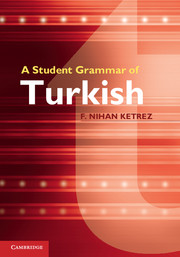Book contents
- Frontmatter
- Contents
- Acknowledgments
- Conventions used in the book
- Chapter 1 Introduction
- Chapter 2 The sounds of Turkish
- Chapter 3 The noun: an overview
- Chapter 4 Case markers
- Chapter 5 Genitive and possessive
- Chapter 6 Numerals and plurality
- Chapter 7 Existential var / yok
- Chapter 8 Pronouns
- Chapter 9 The verb: an overview
- Chapter 10 -Iyor, the progressive
- Chapter 11 Future with -(y)AcAK
- Chapter 12 Past with -DI and -(y)DI
- Chapter 13 -mIş and -(y)mIş
- Chapter 14 Present tense with the aorist -Ir/-Ar
- Chapter 15 -mAktA and -DIr
- Chapter 16 Imperative and optative
- Chapter 17 Compound tenses
- Chapter 18 Person markers
- Chapter 19 Postpositions
- Chapter 20 Passive
- Chapter 21 Causative
- Chapter 22 Reflexive
- Chapter 23 Reciprocal
- Chapter 24 Subordination
- Chapter 25 Infinitives with -mA and -mAK
- Chapter 26 Adjectives
- Chapter 27 Adverbials
- Chapter 28 Conditional
- Chapter 29 Ability and possibility with -(y)Abil
- Chapter 30 Obligation and necessity
- Chapter 31 Relative clauses
- Chapter 32 Word order
- Chapter 33 Questions
- Chapter 34 Negation
- Chapter 35 Coordination
- Chapter 36 Diminutive
- Chapter 37 Reduplication
- Chapter 38 Interjections and some idiomatic expressions
- Chapter 39 Spelling and punctuation
- Chapter 40 Conversation
- Appendix A Verbal inflection paradigms
- Appendix B Nominal inflection paradigms
- Appendix C Verbs categorized according to their case-marked complements
- Appendix D Verbs categorized according to their clausal complement types
- Appendix E Selected grammar books for further study
- Appendix F Answer key to the exercises
- Appendix G Glossary of grammatical terms
- Index
Chapter 39 - Spelling and punctuation
Published online by Cambridge University Press: 05 June 2012
- Frontmatter
- Contents
- Acknowledgments
- Conventions used in the book
- Chapter 1 Introduction
- Chapter 2 The sounds of Turkish
- Chapter 3 The noun: an overview
- Chapter 4 Case markers
- Chapter 5 Genitive and possessive
- Chapter 6 Numerals and plurality
- Chapter 7 Existential var / yok
- Chapter 8 Pronouns
- Chapter 9 The verb: an overview
- Chapter 10 -Iyor, the progressive
- Chapter 11 Future with -(y)AcAK
- Chapter 12 Past with -DI and -(y)DI
- Chapter 13 -mIş and -(y)mIş
- Chapter 14 Present tense with the aorist -Ir/-Ar
- Chapter 15 -mAktA and -DIr
- Chapter 16 Imperative and optative
- Chapter 17 Compound tenses
- Chapter 18 Person markers
- Chapter 19 Postpositions
- Chapter 20 Passive
- Chapter 21 Causative
- Chapter 22 Reflexive
- Chapter 23 Reciprocal
- Chapter 24 Subordination
- Chapter 25 Infinitives with -mA and -mAK
- Chapter 26 Adjectives
- Chapter 27 Adverbials
- Chapter 28 Conditional
- Chapter 29 Ability and possibility with -(y)Abil
- Chapter 30 Obligation and necessity
- Chapter 31 Relative clauses
- Chapter 32 Word order
- Chapter 33 Questions
- Chapter 34 Negation
- Chapter 35 Coordination
- Chapter 36 Diminutive
- Chapter 37 Reduplication
- Chapter 38 Interjections and some idiomatic expressions
- Chapter 39 Spelling and punctuation
- Chapter 40 Conversation
- Appendix A Verbal inflection paradigms
- Appendix B Nominal inflection paradigms
- Appendix C Verbs categorized according to their case-marked complements
- Appendix D Verbs categorized according to their clausal complement types
- Appendix E Selected grammar books for further study
- Appendix F Answer key to the exercises
- Appendix G Glossary of grammatical terms
- Index
Summary
The most recent Turkish alphabet and the writing conventions were adopted in late 1920s, which is pretty recent. Therefore, Turkish spelling is very regular and predictable. Each alphabet character represents a phoneme in a word's spelling, although there are some exceptions to this generalization.
Long and short vowels
Long vowels are not indicated in writing because Turkish does not have long vowel alphabet characters. They used to be spelled with a circumflex accent (^) in the past, but it is no longer used. You may still see such spellings in older or more traditional texts. Here are some examples, where the first vowel of the word is long. In the last two examples, the final vowels are long too.
mali ‘financial’
lazım ‘necessary’
galiba ‘perhaps’
hala ‘still’
You need to learn whether words have long vowels or not.
Fronted vowels
Fronted vowels in mostly Persian borrowings and borrowings from other languages are not marked in any way, so, you need to learn these too.
- Type
- Chapter
- Information
- A Student Grammar of Turkish , pp. 268 - 275Publisher: Cambridge University PressPrint publication year: 2012
- 1
- Cited by



